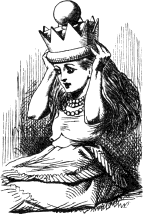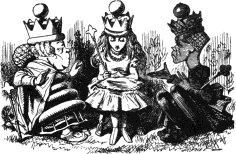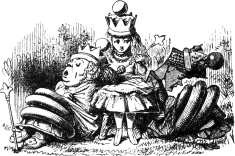Queen Alice
Studies in Alice XXIII, by Marc Edmund Jones This lesson considers the first part of the ninth chapter of Through the
Looking-Glass or to the point of Alice's introduction to the banquet hall
and the twenty-third great principle of wisdom in the Philosophy of
Concepts as revealed through the adventures of Alice is that greatness is
never great to itself or that individuals who are truly significant to life do
not find any pleasure in the mere fact of the significance but gain their
sustenance of consciousness in the struggle and resulting victories in
whatever field of effort engrosses them. Commonness in endeavor and
in responsibilities shared is the basis of interest in life. Higher things so
called are said by the one who has not yet grown up to them to be over
his head and so uninteresting and only the fields of effort in which men
may meet other men as peers and associates in consciousness, or the
types of activity that are duplicated among men and women associated in any particular social
scheme, are open to mastery and individual conquest because under other circumstances the
all-essential element of interest is lacking. Greatness is not to be taken as that which men share
commonly in fact although those who do not posses it do share it in consciousness and so find it
interesting since, if it were some detail of character or some achievement in act possessed by all
of the individuals immediately concerned, it would lack the element of difference or contrast that
makes it great or creates it as greatness in fact. From the point of view of those who recognize it
there is commonness in its sharing through the appreciation or participation in consciousness but
from the point of view of the individual who is great there is no commonness either in character
or act but rather a complete independence from the elements that render those about him rather
commonplace in contrast with himself. Greatness is a transposition to a higher plane as a whole
of interests or elements of commonness. Those who are not great behold the phenomenon in
contrast with themselves and those who are great see in other and lesser men that which is
common to them with the lack of greatness in others as incomprehensible to them as their own
greatness is in reality incomprehensible to those who lack it.
This lesson considers the first part of the ninth chapter of Through the
Looking-Glass or to the point of Alice's introduction to the banquet hall
and the twenty-third great principle of wisdom in the Philosophy of
Concepts as revealed through the adventures of Alice is that greatness is
never great to itself or that individuals who are truly significant to life do
not find any pleasure in the mere fact of the significance but gain their
sustenance of consciousness in the struggle and resulting victories in
whatever field of effort engrosses them. Commonness in endeavor and
in responsibilities shared is the basis of interest in life. Higher things so
called are said by the one who has not yet grown up to them to be over
his head and so uninteresting and only the fields of effort in which men
may meet other men as peers and associates in consciousness, or the
types of activity that are duplicated among men and women associated in any particular social
scheme, are open to mastery and individual conquest because under other circumstances the
all-essential element of interest is lacking. Greatness is not to be taken as that which men share
commonly in fact although those who do not posses it do share it in consciousness and so find it
interesting since, if it were some detail of character or some achievement in act possessed by all
of the individuals immediately concerned, it would lack the element of difference or contrast that
makes it great or creates it as greatness in fact. From the point of view of those who recognize it
there is commonness in its sharing through the appreciation or participation in consciousness but
from the point of view of the individual who is great there is no commonness either in character
or act but rather a complete independence from the elements that render those about him rather
commonplace in contrast with himself. Greatness is a transposition to a higher plane as a whole
of interests or elements of commonness. Those who are not great behold the phenomenon in
contrast with themselves and those who are great see in other and lesser men that which is
common to them with the lack of greatness in others as incomprehensible to them as their own
greatness is in reality incomprehensible to those who lack it.
 Here is the principle of equality. There must be a
balance or a point of equilibrium at every stage of growth
which is the real foundation of consciousness and of life
interests. However, the point of importance in this
lesson is not recognition of this basis of self-expression
that in its static state may be and is taken for granted but
rather an intelligent readjustment of life when an
individual finds himself elevated or projected upward into
a new world of self-expression or a world in which he has
yet to put down and recognize his facts of commonness with and in the new environment. The
symbolism of this section of the ninth chapter is unusually interesting in its portrayal of Alice
and her difficulty in acting as queen in company with the two queens who have long known that
status. This is the ordeal of manifestation among peers or equals and the points are beautifully
brought out by Lewis Carroll in his dialogue. Most striking is the constant misunderstanding of
terms as representing the differences in experience on the lower and higher planes followed by
the prompt going to sleep of the two queens when all attempts at community of interest have
failed. That it is the queens and not Alice that surrender to slumber is simply an illustration of
the point already brought out. The lower plane can be conscious of the higher without rapport or
in forms of contrast but the reverse is impossible. A great individual is wholly unconcerned
over an estimation of himself that may prevail among those at a stage below him in
consciousness.
Here is the principle of equality. There must be a
balance or a point of equilibrium at every stage of growth
which is the real foundation of consciousness and of life
interests. However, the point of importance in this
lesson is not recognition of this basis of self-expression
that in its static state may be and is taken for granted but
rather an intelligent readjustment of life when an
individual finds himself elevated or projected upward into
a new world of self-expression or a world in which he has
yet to put down and recognize his facts of commonness with and in the new environment. The
symbolism of this section of the ninth chapter is unusually interesting in its portrayal of Alice
and her difficulty in acting as queen in company with the two queens who have long known that
status. This is the ordeal of manifestation among peers or equals and the points are beautifully
brought out by Lewis Carroll in his dialogue. Most striking is the constant misunderstanding of
terms as representing the differences in experience on the lower and higher planes followed by
the prompt going to sleep of the two queens when all attempts at community of interest have
failed. That it is the queens and not Alice that surrender to slumber is simply an illustration of
the point already brought out. The lower plane can be conscious of the higher without rapport or
in forms of contrast but the reverse is impossible. A great individual is wholly unconcerned
over an estimation of himself that may prevail among those at a stage below him in
consciousness.
The achievement of imagination in the first half of the chapter, or the twenty-third great scientific anticipation, is the revelation here of the principles of government or the science of manipulation of group will and organization of public relations of the community. Most of the points of importance here have already been covered in prior lessons of this series (XVII-IX) but of supreme importance in any successful administration of state affairs, whether in the smallest community or largest possible political unit, is the realization of the nonexistence in fact of those who govern their fellows. A leader of people under any circumstances must first of all be a symbol to the group consciousness and wise indeed is a ruler who keeps himself more or less a myth or who lives up to a popular ideal of himself rigorously. A ruler cannot feel his own personal importance and survive. Thus years ago Nick Altrock pitched a magnificent winning baseball game in a World's Series and won merited applause. He then paraded in front of the grandstand to receive more of it and was promptly hissed. Out on the field he was a symbol. In front of the stand he was too close and too human for homage to be paid to him. Mankind will not have its leaders humanized at the cost of seeing achievement on higher planes made part of that lower existence where the led themselves may know no joy of leading their fellows. Man wishes to keep intangible that which he cannot touch within himself.
The symbolism of the door to the banquet hall is fascinating in the fact that it possesses one bell for the visitors and one for the servants but none for the proprietor. He who achieves must have his own latchkey to the premises of his accomplishment. The visitors are those who are honored or those to whom the achievement contributes and there is reason for their entrance. The servants are those who do homage or those who contribute to the achievement and there is equal reason for their entrance. But the proprietor is the one who has achieved and the achievement is within himself and his reality is in the higher and here nonexistent plane. He is the door on which his name is inscribed as the Queen Alice above that door would not admit her while she knocked at it or saw it as separate from herself.
 The law of applied psychology, or the twenty-third big
idea for the solution of personal problems, is brought out
here in the technique of self-appreciation. A man must
appreciate himself to be appreciated by others.
Appreciation as it is known outside the person is no more
than the reflection of mirroring of the consciousness of
that person's indwelling. Therefore at the beginning of
this ninth chapter when Alice becomes a queen at last she
is to be seen talking to herself as a queen and coaching
herself in the way she should act or giving appreciation to herself as well as exacting it of herself.
This activity founded wholly in this new realm brings the other queens to her just as later her
inability to converse or maintain commonness of interest in this realm loses them to the grip of
their slumber. Man as he evolves discovers that there must be a change in action to fit each step
of growth and learns that stiffness of all new expression must be worn or walked off. The
student must learn to DECLARE A STANDARD or to create his own reality in some realm of
higher than his known experience and present status. Man in reality is crowned by himself
always. It is his achievement that brings honors to him. Thus it is stated that under the Solar
Mysteries commissions are self-bestowed.
The law of applied psychology, or the twenty-third big
idea for the solution of personal problems, is brought out
here in the technique of self-appreciation. A man must
appreciate himself to be appreciated by others.
Appreciation as it is known outside the person is no more
than the reflection of mirroring of the consciousness of
that person's indwelling. Therefore at the beginning of
this ninth chapter when Alice becomes a queen at last she
is to be seen talking to herself as a queen and coaching
herself in the way she should act or giving appreciation to herself as well as exacting it of herself.
This activity founded wholly in this new realm brings the other queens to her just as later her
inability to converse or maintain commonness of interest in this realm loses them to the grip of
their slumber. Man as he evolves discovers that there must be a change in action to fit each step
of growth and learns that stiffness of all new expression must be worn or walked off. The
student must learn to DECLARE A STANDARD or to create his own reality in some realm of
higher than his known experience and present status. Man in reality is crowned by himself
always. It is his achievement that brings honors to him. Thus it is stated that under the Solar
Mysteries commissions are self-bestowed.

Sabian.org





